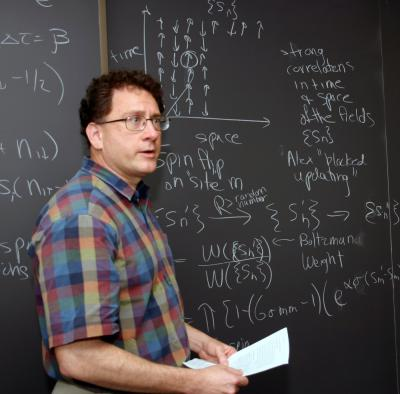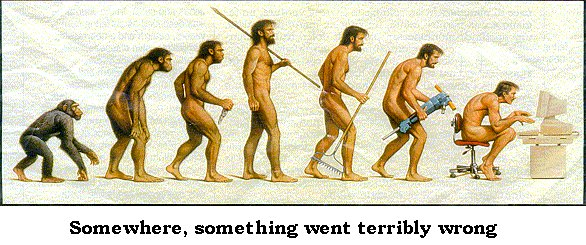|
Mark
Jarrell
|

|
|
jarrellphysics at gmail.com
room 285 Nicholson
(225)-578-7528
|
|
|
Research
Interests: My
main area of interest lies in the physics of strongly correlated
electronic materials which include many nanostructures, high Tc
superconductors, and heavy
Fermion and magnetic materials. These materials are characterized by
one or more of the following phenomena: competing phases such as a
Mott-Hubbard, Mott or Anderson insulators, magnetism,
superconductivity, non-Fermi liquid phases, quantum criticality where
the transition temperature of one or more of these phases vanishes.
In general, exact solutions of models of these systems are not
possible, and attempts to use uncontrolled analytic techniques have
met with limited success. However, in addition to the usual many-body
techniques, I have developed techniques which separate the problem
into strongly interacting and weakly interacting parts. The weakly
interacting parts are treated with either perturbation theory or
mean-field approaches, and then integrated out of the action. The
remaining strongly interacting part of the action may be mapped to a
small effective cluster problem which is treated with Quantum Monte
Carlo (QMC) or other non-perturbative approaches. I have also
developed methods used to analytically continue QMC imaginary time
results to real frequencies. This allows QMC simulations to address
experiments such as reflectivity, photoemission, inelastic neutron
scattering and transport. Finally, I am interested in high-throughput
methods which enable the computer to search for interesting
material's properties that may be validated experimentally. For more
information, please see the links below:
For more
information about my research:
Other Research Related
Links:
Useful Guides, HowTo's,
Templates, etc.:
Previous Students:
Hossein
Akhlaghpour, 1990-1995,
Thesis:
Paper Only, Position: System
Developer, Anthem Corp.
Woonki
Chung , 1991-1996,
Thesis:
Quantum Monte Carlo Study of Electron Correlation Effects in
Superconductors ,
Position: System Administrator, Georgetown University Dept. of
Physics.
Amitava
(Amit) Chattopadhyay 1993-1998,
Thesis: Non-Fermi-Liquid Ground
States in Certain Heavy Fermion Systems, Position: Research
Scientist, IBM Almaden.
Alireza
Tahvildarzadeh 1993-1998,
Thesis: A
Numerical Study of Strongly Correlated Electron Systems,
Position: Postdoc, Georgetown University.
N.S.
Vidhyadhiraja,
Shared with H.R. Krishnamurthy, Professor, JNC, Bangalore.
Thomas
Maier (shared with
Th. Pruschke) 1996-2000, Thesis: Non-Local
Dynamical Correlations in Strongly Interacting Fermion Systems,
Position: Wigner Fellow, Oak Ridge National Labs.
Karan
Aryanpour 1999-2003,
Thesis: Approximation
Techniques in Strongly Correlated Electron Systems, Position:
Postdoc at University of California, Davis.
Muhammad
Aziz Majid (shared
with J. Moreno), 1999-2006, Thesis: Computational
Studies of Ferromagnetism in Strongly Correlated Electronic Systems,
Position: postdoc
Univ. of North Dakota.
D.
G. S. P. Doluweera, 2008,
Thesis: Effect
of Weak Inhomogeneities in High Temperature
Superconductivity,Position: postdoc at Georgia State University.
B.Q.
Cao (shared with
J. Meller), Thesis: On
Applications of Statistical Learning to Biophysics, Postdoc at
Postdoc at U. of Nebraska.
Cyrill
Slezak (shared
with R. Endorf), 2001-2006, Thesis: Methods
for Correlated Electron Systems Assistant Professor at Utah
Valley University.
Majid
Nili (shared with
Juana Moreno), 20??-2010, Thesis: Ferromagnetism
and Transport in Diluted Magnetic Semiconductors, Postdoc at
Penn State.
Herbert
Fotso 2005-2011,
Thesis: Two-Particle
Level Diagrammatic Approaches for Strongly Correlated Systems,
Assistant Professor. University of Albany.
Karlis
Mikelsons (shared
with J. Moreno), 2009, Thesis: Extensions
of Numerical Methods for Strongly Correlated Electron Systems,
Ehsan
Khatami
(shared
with J. Moreno), 2009, Thesis: Criticality
and Superconductivity in the Two-dimensional Hubbard Model of
Strongly Correlated Electronic Systems,
Peng
Zhang
,Thesis:
Numerical
Investigations of Holstein phonons on the periodic Anderson Model,
Position:
Professor
Xi'An Jiaotong University
Peter
Reis
(shared
with J. Moreno), Thesis: Magnetic
Compensation in the Bimetallic Oxalates and the Cerium Volume
Collapse.
Kuang-Shing
Chen
(shared
with J. Moreno), Thesis: Quantum
Simulations on Square and Triangular Hubbard Models.
Chinedu
Ekuma (shared with
J. Moreno), Thesis: Towards
the Realization of Systematic, Self-Consistent Typical Medium Theory
for Interacting Disordered Systems
Ryky
Nelson (shared
with J. Moreno), Thesis: First-Principles
and Many-Body Methods: Implementations and Applications to Study
Spintronic Materials
Kalani
Hettiarachchilage
(shared
with J. Moreno), Thesis: Strongly
correlated ultra-cold bosonic atoms in optical lattices
Patrick
Haase (shared
with Thomas Pruschke), Thesis: Dual
Fermion Approach to Disordered Correlated Systems.
Nagamalleswararao
Dasari (shared
with Vidhyadhiraja
Sudhindra), Thesis: Development
and application of computational quantum many-body methods for
strongly correlated models and materials
Sheng
Feng, Thesis:
Study
of Condensed Matter Systems with Monte Carlo Simulation on
Heterogeneous Computing Systems
Yun
(Eric)
Ding
(Shared
with M. Brylinski) Thesis:
Data-Driven
Rational Drug Design.
Sudeshna
Sen
(shared
with Vidhyadhiraja Sudhindra), Thesis: Emergent
phenomena in spatially and energetically inhomogeneous strongly
correlated model electron systems.
Wasim
Raja Mondal (shared with Vidhyadhiraja Sudhindra)
Previous
Postdocs:
Hanbin
Pang, Lead Software Developer, CenturyLink.
Matthias
Hettler. Institut fuer Nanotechnologie, Karlsruhe, Germany.
William
Putikka. Assoc.
Prof., The Ohio State University (Mansfield).
Samuel
Moukouri. Senior Researcher in Physics at Ben Gurion University
Thomas
Maier, Oak Ridge National Laboratory.
Carey
Huscroft, Hewlett Packard.
Juana
Moreno, Associate Professor, LSU.
Brian
Moritz, SLAC research staff.
Paul
Kent, ORNL/UT JINCS.
Unjong
Yu, Assistant Professor, GIST-college
Dimitris
Galanakis, World Traveler
Alex
Macridin, FermiLab Research Staff.
Zi
Yang Meng, Associate Professor at Institute of Physics, Chinese
Academy of Sciences
Valy
Rousseau, Assistant Prof., Loyola University
Hanna
Terletska, Postdoc University of Michigan (E. Gull Group)
Shuxiang
Yang,
Present Research Group:
Students:
Conrad Moore,
Samuel Kellar, Enzhi Li
Postdocs: Ka
Ming Tam, Yi Zhang
Senior
Collaborators: Vidhyadhiraja
Sudhindra, Tom Berlijn, Wei Ku, Liviu Chioncel, Michal Brylinski.
Teaching
Interests: During
the development of a graduate course in classical electrodynamics I
became heavily involved in the use of computers in graduate
education. I find that my students can use computer to solve more
realistic homework problems, visualize their answers, and reduce the
algebraic tedium. The computer also allows me to distribute the
related courseware, and provide more realistic classroom
demonstrations in the various electronic classrooms on campus. Two
courses are being developed in this way. Please see the links below
for more information.




Provide Website
Feedback
Accessibility
Statement




